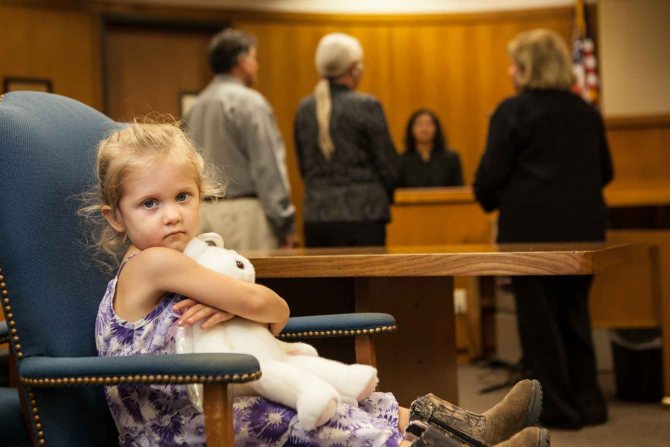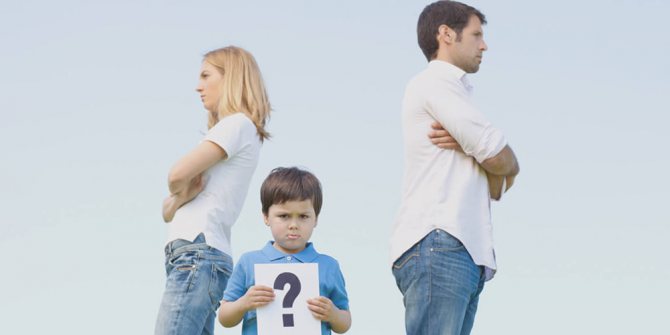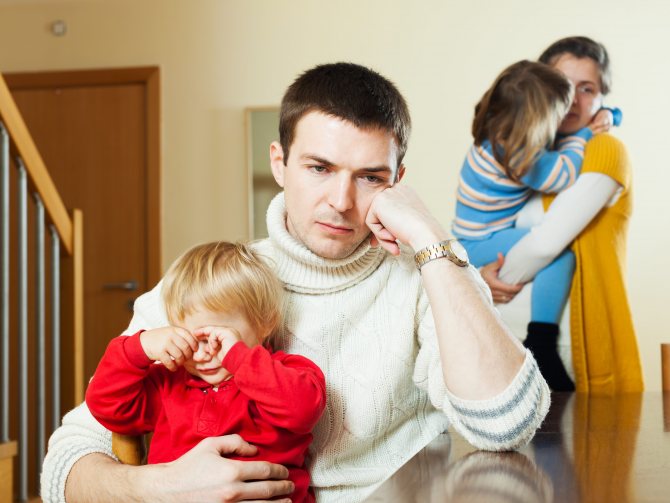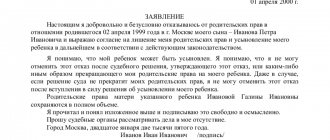Have you made plans together and decided to shelter an orphan or adopt your second spouse’s baby? But it happens that fate takes an unexpected turn, and you have to dissolve a failed marriage.
Many here want to know whether it is possible to abandon an adopted child after a divorce or not? The most important thing is not to get excited, since there are always legal ways out of a difficult situation.
What grounds for abandoning a child are provided by law?
Reasons are certain desires and circumstances that force adoptive parents to abandon a child. And the grounds are clear conditions, without compliance with which a legal refusal is impossible.
There are reasons why third parties, for example, representatives of guardianship authorities, can initiate the cancellation of adoption in court (clause 1 of Article 141 of the RF IC). These include:
- cruel attitude of adoptive parents towards children;
- the presence of chronic alcoholism or drug addiction in parents;
- avoidance of parental responsibilities;
- abuse of your rights as a parent.
The court may take into account other grounds and, on their basis, cancel the adoption (clause 2 of Article 141 of the RF IC). These include, for example:
- identification of a child with a serious physical or mental illness;
- lack of trust between the child and his adoptive parents.
Legal practice shows that even the presence of hostility between parents (or one of the parents) and the adopted child can serve as grounds for canceling the adoption.
However, this does not mean that it is very easy to relieve oneself of obligations towards the adopted child for any reason. Nevertheless, the reasons must be compelling, and the court considers each situation individually, taking into account life circumstances.
Common reasons why one or both parents refuse to adopt
Depriving a child of one or both parents who abandon him during a divorce creates sad statistics. The reasons that provoke parents to commit an unsightly act come down to the following:
- a child from an orphanage was taken by one of the parents, for example, by the husband, and after the divorce the woman refuses to have common ties with both her husband and the adopted child;
- the couple was unable to reach complete mutual understanding with the minor, feelings of fatherhood and motherhood were not awakened, and after the divorce, the adopted child became a burden;
- children did not fit into the concept of a new life after divorce;
- the spouse does not want to bear financial responsibility for a child who is not related to him by blood.
No matter how such actions are condemned by society, abandonment of adopted children after divorce is not uncommon.
Who can initiate the process of canceling an adoption?
Persons who may initiate legal proceedings to revoke an adoption include:
- the adoptive parents themselves;
- the adopted child himself (if he has already reached the age of 14);
- biological parents of this child (if they were not declared incompetent or were not deprived of parental rights);
- child protection;
- prosecutor.
Let's look at an example:
The couple adopted a child and divorced two years later. The ex-husband moved to another city and stopped communicating with the child. After some time, the adoptive mother filed a lawsuit to cancel the adoption. The basis was the failure of the former spouse to fulfill parental obligations towards the child. The court granted the claim and ordered the former adoptive parent to pay child support.
Thus, the very fact of the adoptive parents’ divorce is not grounds for canceling the adoption. Other serious life circumstances may serve as a reason.
Let's sum it up
Both personal reasons for canceling the adoption and the grounds provided for by current domestic legislation are put forward. To cancel an adoption, you must go to court with a claim and a package of required documentation. The duration of consideration of the case in court is 2 months, the period for the decision to enter into legal force is 1 month.
Yulia Gromovenko
Practicing lawyer. Graduate of the Department of Commercial Law and Fundamentals of Law, Faculty of Law, Moscow State University named after M.V. Lomonosov. Currently an expert author on legal websites. Author's page
Procedure for canceling adoption after divorce
What should be done:
- Prepare the necessary documents.
- File a claim in court.
- Take part in all court hearings.
- Get a court decision.
How to draw up a claim correctly
The legal norms for filing a claim are specified in Art. 131-132 Code of Civil Procedure of the Russian Federation.
It is very important to draft a claim correctly: its content must be legally correct, all facts must be documented, and the text must not contain errors.
Any errors and omissions are grounds for returning the documents to the plaintiff. Correcting mistakes and re-filing a claim can significantly delay the legal process.
What points should be included in the content of the claim:
- name of the court where the claim is filed;
- personal data of the plaintiff and defendant;
- data of third parties (for example, a guardianship representative);
- title;
- circumstances of the case (dates of marriage and divorce, date of adoption of the child, who initiated the adoption, what kind of relationship developed between the former spouses and the child);
- grounds for cancellation of adoption;
- list of evidence, claims;
- list of attached documents;
- date, signature.
Typically, a statement of claim is filed with the district court at the defendant’s place of residence, but if the child lives with the plaintiff, it can also be filed at the plaintiff’s place of residence.
If the claim is filed by the parent with whom the adopted child lives, he will be the plaintiff. And the defendant will be the second parent, whom the plaintiff wants to deprive of parental rights.
If both parents file a lawsuit, the child will be the defendant. The interests of the minor defendant are represented by the prosecutor and guardianship authorities.

What documents must be attached to the claim?
All circumstances set out by the plaintiff in the statement of claim must be documented (Article 132 of the Code of Civil Procedure of the Russian Federation). The list of documents serving as evidence is individual and depends on the circumstances of the case.
List of required documents:
- marriage and divorce certificate;
- child's birth certificate;
- court decision on his adoption;
- document confirming payment of the state duty.
What other documents may be required depending on the circumstances of the case:
- medical report, extract from medical history;
- psychological and pedagogical characteristics of the child;
- resolution on an administrative offense.
Package of necessary documents
The basis for the trial is the following materials:

- documentary evidence of all the facts stated in the claim;
- certificate of marriage or divorce;
- duty payment receipts;
- characteristics of the parents;
- baby's birth certificate.
Reasonable justification for refusing paternity are the following:
- honey. a certificate certifying the inability to have children;
- evidence regarding the absence of the father at the time of conception;
- confirmation of the wife’s relationship with another man;
- conclusion of DNA testing.
Features of the trial
Cases of refusal to adopt a child are considered within the framework of the Code of Civil Procedure of the Russian Federation. They are generally similar to other civil cases, but have a number of features:
- The case is heard only by the district court.
- A guardianship representative and a prosecutor take part in all court hearings.
- If a child is the defendant, his interests are represented by third parties (guardianship representative and prosecutor). If a child over 14 years of age is the plaintiff, then his adoptive parents (or adoptive parent) will be the defendant.
- During the hearing, the court determines the reliability of the information presented and the seriousness of the grounds for canceling the adoption. If necessary, witnesses may be invited and a forensic examination may be ordered.
- If the adopted child is already 10 years old, his opinion will definitely be taken into account by the court.
- Adoptive parents need to be prepared for the fact that the court, in the event of cancellation of the adoption, may collect from them alimony for the maintenance of a child up to 18 years of age (or until a new adoption).

How long does the trial last?
According to Art. 154 of the Code of Civil Procedure of the Russian Federation, civil cases are considered by the court within two months from the date of receipt of the application.
Another month is given for the court decision to come into force.
However, if an examination was ordered, the trial period will be extended.
What is the fee?
If the claim is filed by both adoptive parents, they are required to pay a state fee of 300 rubles. (Article 333.19 of the Tax Code of the Russian Federation).
If the claim was filed by one adoptive parent (against another) or third parties, they do not pay the fee, since they are acting in the interests of the minor.
In addition, you need to be prepared for other expenses: notarization of documents, legal consultations.
Questions and answers
- My husband and I divorced in 2021. The ex-husband wants to refuse to adopt a daughter from his first marriage so as not to pay child support. Will he be able to do it? Lawyer's answer: the spouse can formalize the refusal of adoption by going to court, but he cannot refuse to pay alimony, since his rights in relation to the minor will cease, but not his obligations.
- We adopted a baby from an orphanage, but during the divorce we filed a cancellation of the adoption. Now this child is already an adult, and I am wondering whether, due to his inability to work, I can receive financial assistance from him? Lawyer's answer: no, because when the adoption is canceled, mutual rights and obligations cease in accordance with Art. 143 RF IC.
- My stepfather adopted me at the age of 3, and 10 years later he divorced my mother. While married, he was rude, intimidated, and treated me cruelly. Now I’m 18, I want to return my mother’s last name and refuse to adopt him, so that he ceases to be the father in the documents. Is this possible? The lawyer's answer: yes, but only with the consent of the stepfather, mother and your biological father.
Rash decisions lead to personal tragedies, and the worst is when the main characters are children. But if this is the case, lawyers from ros-nasledsvtvo.ru will help you get into the situation and understand the intricacies of the process.
Sometimes adoption occurs thoughtlessly, for example, trying to win the favor of a woman, the stepfather promises to adopt her daughter or son, treating the child with indifference or feeling hostility. In such cases, the cancellation of adoption is a good thing. Another situation is the abandonment of the child by both adoptive parents. This decision should be approached with maximum responsibility, trying not to miss the slightest opportunity to raise a child in a family, albeit an incomplete one.
FREE CONSULTATIONS are available for you! If you want to solve exactly your problem, then
:
- describe your situation to a lawyer in an online chat;
- write a question in the form below;
What are the consequences of canceling an adoption?
For the adoptive parent:
- abolition of the right to demand maintenance in old age from a child;
- the possible emergence of an obligation to pay child support until the age of 18 (or until re-adoption).
For a child:
- abolition of the right to inherit property of adoptive parents;
- change of place of residence (return to natural parents, relatives or to an orphanage);
- the opportunity to return the previous last name, first name and patronymic (if the child is already 10 years old).
Let's look at an example:
According to the court decision, the adoption of a child by the ex-husband of citizen E.A. was cancelled. A few months after the decision came into force, the defendant died. E.A. tried to prove the child’s rights to receive the deceased’s inheritance, but the court refused, since the child had already lost all property rights to the inheritance of the former adoptive parent.











